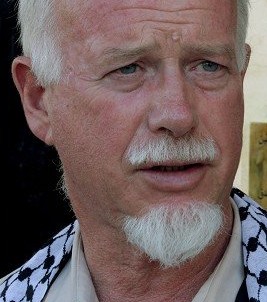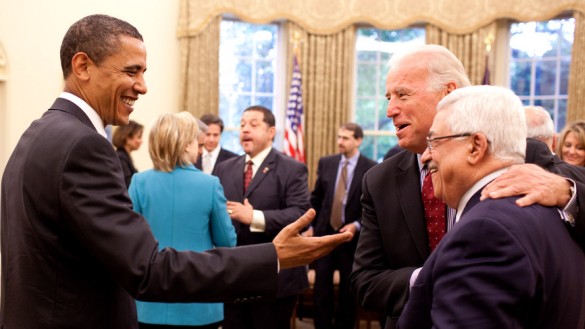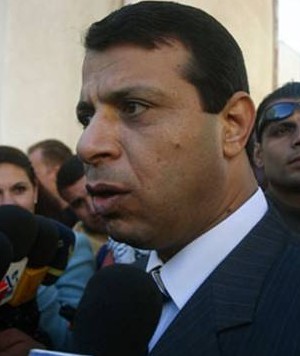Jewish Fatah delegate nominated to Revolutionary Council
Ma’an, August 9, 2009
A Jewish member of Fatah was nominated for a spot on the movement’s Revolutionary Council on Saturday.
Jewish member of Fatah was nominated for a spot on the movement’s Revolutionary Council on Saturday.
Vowing to step up lobbying efforts worldwide if elected, Dr Uri Davis told Ma’an one of Fatah’s weakest attributes has been its failure to establish ties with international parties, movements and human rights organizations.
In an interview, Davis played down the significance of his nomination to the Revolutionary Council, Fatah’s 120-member governing body. Each member of the movement has the right to run for office despite one’s religion, race or color, the Fatah delegate noted. [continued…]
Dahlan, Qureia vie to succeed Abbas as Fatah chief
By Avi Issacharoff, Haaretz, August 9, 2009
Elections for Fatah’s main governing bodies, the Central Committee and the Revolutionary Council, were expected to take place on Sunday, with two party strongmen, Mohammed Dahlan and Ahmed Qureia leading the nominee list for leadership posts.
On Saturday, Palestinian President Mahmoud Abbas was re-elected to chair the Central Committee at the party’s first convention in two decades, held in the West Bank city of Bethlehem since last Tuesday.
Sunday’s election was to name the 18 members of the Central Committee, who will be joined by four members to be named by the committee itself. In addition, elections for the 120-member Fatah Revolutionary Council were also scheduled for Sunday.
Qureia was the first Palestinian Prime Minister, and is currently heading the peace negotiations team for the Palestinian Authority. Dahlan, the former head of the Palestinian Authority Preventative Security Forces in Gaza, left the Strip in 2007 shortly before rival party Hamas violently seized control over Gaza.
The two have waged a tough political battle, as both are considered candidates to succeed Abbas. The two haven’t expressly announced any plans to succeed the Palestinian president, but they are considered to be the two strongest Fatah members after Abbas. Assuming that Marwan Barghouti, also considered a strong candidate to head the Palestinian Authority, remains in Israeli jail, one of the two will likely be named president once Abbas steps down for whatever reason.
On Saturday, Fatah adopted a position paper stating that the Palestinian national enterprise will not reach fruition until all of Jerusalem, including the outlying villages, come under Palestinian sovereignty.
Also Saturday, the Palestinian news agency Ma’an reported that for the first time, a Jewish candidate had been nominated for a post on the Revolutionary Council. According to Ma’an, Jerusalem-born Dr. Uri Davis explained that every Fatah member can run for a post on the party’s 120-member Revolutionary Council regardless of religion, race or color.
“Breaking the Silence” or silencing the critics?
By Louis Frankenthaler, Electronic Intifada, August 7, 2009
“Breaking the Silence” is a member of the Israeli human rights, peace and social justice community. The group’s only crime, so it seems, lies in its effort to offer an alternative ethical voice in a society that is arguably losing its way. Breaking the Silence provides a platform for soldiers to testify to acts of violence and other violations of Palestinian rights that they may have witnessed or taken part in during their service in the Occupied Palestinian Territory. The group’s most recent report details soldier testimonies that raised serious concerns about Israeli military behavior during the war on Gaza, “Operation Cast Lead.” The publication is unique but it is only one example of many public statements, reports and legal advocacy in response to the prosecution of the war, which Israel consistently maintains was both moral and legal. Why then is the Israeli government waging a battle against this organization, trying to thwart its funding and, essentially, to shut it down?
The answer, perhaps, lies in the genealogy of the occupation. For 42 years Israel has argued its one acceptable and official truth: “Israel is not an occupier and it is not violating international law.” The problem is that this narrative has been accepted only by Israel, tolerated by the United States, and perpetuated by a broad spectrum of Israel’s “supporters,” largely in North America and Western Europe. In the aftermath of the war the Netanyahu government feels threatened by US President Barack Obama’s demands to halt one of Israel’s most visible violations of international law, settlement building. Part of the Israeli reaction is to try to manipulate discourse and impugn those who have exposed Israeli infractions over the years, choosing to begin with an organization that provides the public with direct insight into the behavior of soldiers. Ironically in its actions the government actually corroborates the group’s work and that of other organizations who report and represent the voices of the Palestinian abject Other, the torture victims, those evicted from their homes, denied access to their fields and those beaten by settlers with impunity. [continued…]
Freezing for failure
By Zvi Bar’el, Haaretz, August 9, 2009
It should be said from the onset: Do not freeze settlement construction, do not stop it in part or periodically, not for six months, not for a single day. As long as the U.S. administration does not present a comprehensive plan that explains its endgame – what the end will look like and what the shape and character of the Palestinian state will look like – the demand for a cessation of construction is pointless. It is a pathetic return to the doctrine of “confidence-building measures,” which led nowhere. The demand to freeze settlement construction is like the demand to remove roadblocks or cease razing homes; all these demands and similar ones mean only one thing: making the continuation of the occupation a little more pleasant.
The demand for a cessation of settlement construction will have no impact on the political process as long as they are not telling the Israeli and Palestinian public what will happen with the half-million Israelis who already live in the West Bank and East Jerusalem. How many of them will have to be evacuated? How much money will this cost and who will pay for it? Evacuating 7,000 Jews from the Gaza Strip cost more than NIS 10 billion.
Even if only 100,000 Jews are evacuated from the West Bank the move will cost, on the basis of this estimate, some NIS 150 billion – about 50 percent of the national budget for an entire year. It is true that it amounts to “only” about 8 percent of the cost of the American war in Iraq to date, and maybe for the sake of peace in the Middle East the U.S. administration would be willing to invest another 8 percent in the area, but someone in Washington must articulate this clearly. That would be much more convincing than halting the work of a crane.
American pressure yielded an impressive achievement when they twisted Prime Minister Benjamin Netanyahu’s arm and got him to say that he wants “two states for two peoples.” But what comes next? Are Netanyahu’s two states the same two as Palestinian President Mahmoud Abbas’ and the same two as Washington’s? Where will the border be demarcated? After all, if it is agreed that the end of the process will leave the settlement blocs in Israel’s hands, and if indeed the Palestinians accept this in return for an exchange of territory, why is it necessary to cease construction in those blocs?
Logic dictates that construction should continue in the blocs and if possible at a faster pace, so that it will be possible to absorb those evacuated from other settlements. But when there is no plan or agreement on the border, not to mention that negotiations are not even taking place, the demand for ceasing construction appears to be some sort of independent aim – isolated from its political context and whose sole intention is to display America’s ability to impose “something” on Israel. Meanwhile, the removal of illegal outposts is not something Washington has proved it is able to impose on Israel, despite Israel’s promises to the Americans and despite all the brouhaha caused by Defense Minister Ehud Barak on the matter last month.
The attempt to understand the American move as an action from the periphery inward – a tactical move meant to lead to further moves, one slice at a time – is leading toward a dead end and might even be dangerous as well. Assuming Israel freezes construction and negotiations resume, and that (although there is no evidence to support it) some Arab states agree to grant Israel grace in the form of normalization, the desired result is that such confidence-building measures will encourage the government to convince the Israeli public to support the process and agree to a withdrawal. But it is not the public that needs to be encouraged; it is the right-wing government for whom the remnants of the Labor Party are serving as apologists. What is worse is that this government may agree to a gradual and temporary cessation of settlement construction, and at the same time will make every effort to prove that there is no worthwhile partner for this “sacrifice” on the other side. At the end of the settlement construction freeze, the government will be able to celebrate the failure of the negotiations and prove to the Americans that the pressure had been put on the wrong side. The chance of restarting the process from there will then be nil.
An honest government would not have to rely on the Arab safety belt in order to shake off the process. It would have taken advantage of the long period of calm in the West Bank and Gaza Strip, the efficiency the Palestinian security forces have exhibited in the West Bank in combating terrorism, and the willingness of Abbas to negotiate seriously in order to tell the public that the quota of confidence-building measures has been fulfilled and the time has come for withdrawing and reaching an agreement. But this is not the sort of government that is running Israel. Washington knows this, as every Israeli citizen does. Hence the need for a comprehensive plan that will be managed with precision and determination. Freezing the settlements is not a plan and is not a prescription.
Lieberman summons envoy in U.S. over leaked rebuke of government
By Barak Ravid, Haaretz, August 9, 2009
The Foreign Ministry on Saturday summoned for consultation a senior Israeli diplomat who in a confidential memo criticized the government for harming ties with the U.S. last week.
A ministry statement said that Israel’s consul-general in Boston, Nadav Tamir, would arrive in Jerusalem next week to give a clarification to the ministry’s director-general.
The memo, which was addressed to the Foreign Ministry in Jerusalem, stressed that the public spat with the U.S. over the issue of a settlements freeze has alienated a significant number of American Jewish supporters.
Tamir, a veteran well respected diplomat, wrote the memo under the heading “melancholy thoughts on Israel-U.S. relations.”
Tamir’s missive is considered unusual given the blunt, pointed nature of the criticism against the premier’s policies.
“The manner in which we are conducting relations with the American administration is causing strategic damage to Israel,” Tamir wrote. “The distance between us and the U.S. administration has clear consequences for Israeli deterrence.”
“There are American and Israeli political elements who oppose [U.S. President Barack] Obama on an ideological basis and who are ready to sacrifice the special relationship between the two countries for the sake of their own political agendas,” the consul general in Boston wrote.
“There has always been a discrepancy in the approaches of both states [on the issue of settlements], but there was always a level of coordination between the governments,” Tamir wrote. “Nowadays, there is a sense in the United States that Obama is forced to deal with the obduracy of the governments in Iran, North Korea, and Israel.”
“The administration is making an effort to lower the profile of the disagreements, and yet it is [Israel] that is the source which is highlighting the differences,” Tamir wrote.
Tamir accused Netanyahu of endangering American Jewish backing for Israel by publicly sparring with the Obama administration over construction of Jewish housing in the West Bank and East Jerusalem.
A spokesperson for Netanyahu issued a statement to Channel 10 which accused Tamir of violating protocol by expressing “political views” against the premier.
Tamir refused a Haaretz request for comment. The Israeli consulate in Boston said the memorandum is an internal Foreign Ministry document that was not for the media’s consumption.
Foreign Ministry spokesman Yigal Palmor told the Associated Press late Thursday, “We don’t comment on leaked reports.”
In a bid to jumpstart the moribund Middle East peace process, the Obama administration has repeated its demand that Israel cease construction in West Bank settlements. The policy is a sharp departure from the tone and substance of Israel-U.S. relations during the presidency of George W. Bush.


 e ran the Gaza Strip like the Godfather, dispensing brutal punishment and benevolent largess. But that was before his summer of disgrace, two years ago, when Hamas militants drove out his armed followers and allowed looters to pick apart his seaside villa.
e ran the Gaza Strip like the Godfather, dispensing brutal punishment and benevolent largess. But that was before his summer of disgrace, two years ago, when Hamas militants drove out his armed followers and allowed looters to pick apart his seaside villa. Jewish member of Fatah was nominated for a spot on the movement’s Revolutionary Council on Saturday.
Jewish member of Fatah was nominated for a spot on the movement’s Revolutionary Council on Saturday.